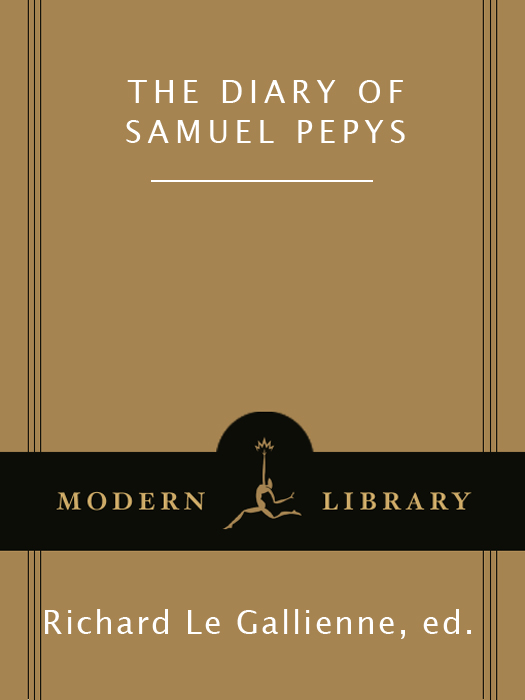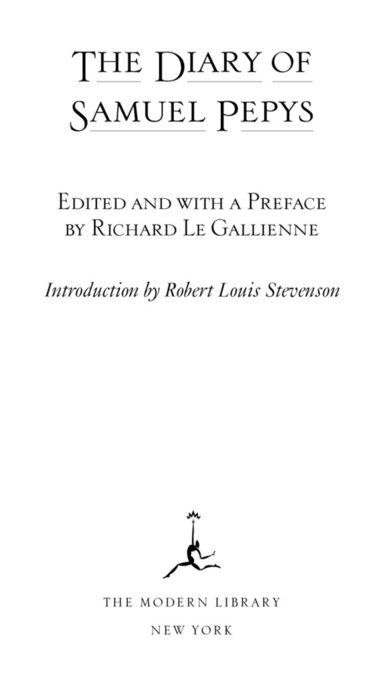2003 Modern Library Paperback Edition
Published in the United States by Modern Library, an imprint of The Random House Publishing Group, a division of Random House, Inc., New York, and simultaneously in Canada by Random House of Canada Limited, Toronto.
M ODERN L IBRARY and the T ORCHBEARER Design are registered trademarks of Random House, Inc.
LIBRARY OF CONGRESS CATALOGING-IN-PUBLICATION DATA Pepys, Samuel, 16331703.
The diary of Samuel Pepys / edited and with a preface by Richard Le Gallienne; introduction by Robert Louis Stevenson.Modern Library ed.
p. cm.
eISBN: 978-0-307-82419-6
1. Pepys, Samuel, 16331703Diaries. 2. Great BritainSocial life and customs17th century. 3. Authors, EnglishEarly modern, 15001700Diaries. 4. Great BritainPolitics and government16601688. 5. StatesmenGreat BritainDiaries. I. Le Gallienne, Richard, 18661947. II. Title.
DA447.P4 A4 2001
941.066092dc21
[B] 00-054817
Modern Library website address:
www.modernlibrary.com
v3.1
Contents
Editors Preface
I NTRODUCTION
Robert Louis Stevenson
T HE D IARY
That there should be such a book as The Diary of Samuel Pepys is incomparably strange. Pepys, in a corrupt and idle period, played the man in public employments, toiling hard and keeping his honour bright. Much of the little good that is set down to James the Second comes by right to Pepys; and if it were little for a king, it is much for a subordinate. To his clear, capable head was owing somewhat of the greatness of England on the seas. In the exploits of Hawke, Rodney, or Nelson, this dead Mr. Pepys of the Navy Office had some considerable share. He stood well by his business in the appalling plague of 1666. He was loved and respected by some of the best and wisest men in England. He was President of the Royal Society; and when he came to die, people said of his conduct in that solemn hourthinking it needless to say morethat it was answerable to the greatness of his life. Thus he walked in dignity, guards of soldiers sometimes attending him in his walks, subalterns bowing before his periwig; and when he uttered his thoughts they were suitable to his state and services. On February 8, 1668, we find him writing to Evelyn, his mind bitterly occupied with the late Dutch war, and some thoughts of the different story of the repulse of the Great Armada:
S IR, You will not wonder at the backwardness of my thanks for the present you made me, so many days since, of the Prospect of the Medway, while the Hollander rode master in it, when I have told you that the sight of it hath led me to such reflections on my particular interest, by my employment, in the reproach due to that miscarriage, as have given me little less disquiet than he is fancied to have who found his face in Michael Angelos hell. The same should serve me also in excuse for my silence in celebrating your mastery shown in the design and draught, did not indignation rather than courtship urge me so far to commend them, as to wish the furniture of our House of Lords changed from the story of 88 to that of 67 [of Evelyns designing], till the pravity of this were reformed to the temper of that age, wherein God Almighty found his blessings more operative than, I fear, he doth in ours his judgments.
This is a letter honourable to the writer, where the meaning rather than the words is eloquent. Such was the account he gave of himself to his contemporaries; such thoughts he chose to utter, and in such language: giving himself out for a grave and patriotic public servant. We turn to the same date in the Diary by which he is known, after two centuries, to his descendants. The entry begins in the same key with the letter, blaming the madness of the House of Commons and the base proceedings, just the epitome of all our public proceedings in this age, of the House of Lords; and then, without the least transition, this is how our diarist proceeds: To the Strand, to my booksellers, and there bought an idle, rogueish French book, Lescholle des Filles, which I have bought in plain binding, avoiding the buying of it better bound, because I resolve, as soon as I have read it, to burn it, that it may not stand in the list of books, nor among them, to disgrace them, if it should be found. Even in our day, when responsibility is so much more clearly apprehended, the man who wrote the letter would be notable; but what about the man, I do not say who bought a roguish book, but who was ashamed of doing so, yet did it, and recorded both the doing and the shame in the pages of his daily journal?
We all, whether we write or speak, must somewhat drape ourselves when we address our fellows; at a given moment we apprehend our character and acts by some particular side; we are merry with one, grave with another, as befits the nature and demands of the relation. Pepyss letter to Evelyn would have little in common with that other one to Mrs. Knipp which he signed by the pseudonym of Dapper Dicky; yet each would be suitable to the character of his correspondent. There is no untruth in this, for man, being a Protean animal, swiftly shares and changes with his company and surroundings; and these changes are the better part of his education in the world. To strike a posture once for all, and to march through life like a drum-major, is to be highly disagreeable to others and a fool for oneself into the bargain. To Evelyn and to Knipp we understand the double facing; but to whom was he posing in the Diary, and what, in the name of astonishment, was the nature of the pose? Had he suppressed all mention of the book, or had he bought it, gloried in the act, and cheerfully recorded his glorification, in either case we should have made him out. But no; he is full of precautions to conceal the disgrace of the purchase, and yet speeds to chronicle the whole affair in pen and ink. It is a sort of anomaly in human action, which we can exactly parallel from another part of the Diary.
Mrs. Pepys had written a paper of her too just complaints against her husband, and written it in plain and very pungent English. Pepys, in an agony lest the world should come to see it, brutally seizes and destroys the tell-tale document; and thenyou disbelieve your eyesdown goes the whole story with unsparing truth and in the cruellest detail. It seems he has no design but to appear respectable, and here he keeps a private book to prove he was not. You are at first faintly reminded of some of the vagaries of the morbid religious diarist; but at a moments thought the resemblance disappears. The design of Pepys is not at all to edify; it is not from repentance that he chronicles his peccadilloes, for he tells us when he does repent, and, to be just to him, there often follows some improvement. Again, the sins of the religious diarist are of a very formal pattern, and are told with an elaborate whine. But in Pepys you come upon good, substantive misdemeanours; beams in his eye of which he alone remains unconscious; healthy outbreaks of the animal nature, and laughable subterfuges to himself that always command belief and often engage the sympathies.
Pepys was a young man for his age, came slowly to himself in the world, sowed his wild oats late, took late to industry, and preserved till nearly forty the headlong gusto of a boy. So, to come rightly at the spirit in which the Diary was written, we must recall a class of sentiments which with most of us are over and done before the age of twelve. In our tender years we still preserve a freshness of surprise at our prolonged existence; events make an impression out of all proportion to their consequence; we are unspeakably touched by our own past adventures, and look forward to our future personality with sentimental interest. It was something of this, I think, that clung to Pepys. Although not sentimental in the abstract, he was sweetly sentimental about himself. His own past clung about his heart, an evergreen. He was the slave of an association. He could not pass by Islington, where his father used to carry him to cakes and ale, but he must light at the Kings Head and eat and drink for remembrance of the old house sake. He counted it good fortune to lie a night at Epsom to renew his old walks, where Mrs. Hely and I did use to walk and talk, with whom I had the first sentiments of love and pleasure in a womans company, discourse and taking her by the hand, she being a pretty woman. He goes about weighing up the











